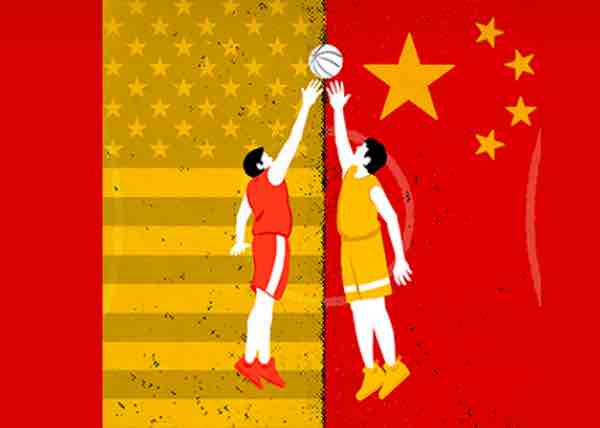Through Sun 11/20
Basketball at Playhouse Square? You better believe it. Lauren Yee’s intriguing The Great Leap, now at the Cleveland Play House, centers around unexpected consequences tied to international basketball “friendship games.”
Sporting arenas are not a usual choice for CPH dramatic stages, usually dedicated to drawing rooms, street scenes or dystopian futures. But San Francisco native Yee’s thoughtful drama in the hands of CPH directors and designers is a winner.
Entering the Outcalt Theatre it was easy to think we were at a basketball game. Two realistic hoops framed a “basketball court” stage and we, the audience, played our part as we filled the stands. Bravo to scenic designer Yu Shibagaki and lighting designer Michael Boll for a vital assist to our imaginations. (The set was so realistic that an announcement before the show informed us that the two exit doors behind the backboard were fake.)
Yee once quipped in an interview that her plays “tend to be comedies, until they are not.” The Great Leap demonstrates that truth. Funny, then tragic, it’s about universal subjects — revolution, conformity, and responsibility — as well as taking chances, both in sports and in life. For almost two hours (with one intermission), we watch as four characters negotiate choices and — yes — take great leaps.
The play (set in 1989 and 1971) weaves a drama about ways Chinese and American relations affect individuals rather than nations. Historically, China and the United States took part in “friendship games.” The Great Leap details events in 1971 when an American basketball coach, Saul, is sent to advise Chinese teams. He meets Chinese coach (and Communist Party operative) Wen Chang, and we observe their comedic interaction as Chang attempts to follow Saul’s English. The two talk about sports and sex. (Is sex really the universal language? Maybe.)
Saul returns to China in 1989, this time taking a 17-year-old San Francisco player, Manford. Manford’s cautious aunt Connie has failed to dissuade him from travelling to China. Perhaps she was right to worry since the impulsive Manford gets lost in Beijing’s Tiananmen Square during the height of the protests there, demonstrations which the Chinese government brutally put down. International complications ensue that directly affect both Manford and Wen Chang.
Director Esther Jun makes such fine use of the actors, it’s easy to forget there are only four. Eric Cheung’s Manford looked and acted like a seventeen-year-old athlete and superstar. As the American Coach Saul, David Mason projected an appropriately brusk energy, an energy anyone in charge of teens might relate to. Reuben Uy’s Wen Chang movingly showed the toll eighteen years of government service can take. Amanda Kuo, as Manford’s older cousin, effectively represented essential family connections.
Bottom Line: Based in part (though not directly) on the playwright’s family history, The Great Leap shares a story to ponder long after the play ends. While it may sound as if it’s about sports (and it is, in a way), it’s far more ambitious as it touches on life’s meaning, purpose, and chances we take. Well- played, CPT, well-played.
